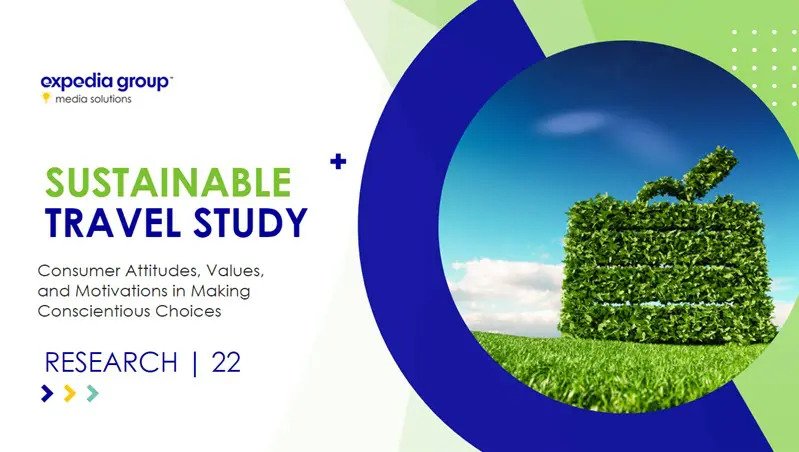Expedia Group: Spotlight on Sustainable Travel - Consumer Attitudes, Values, and Motivations in Making Conscientious Choices
Singapore, 29th April, 2022 - It is well documented that the slowdown during the past two years resulted in positive environmental impacts such as reduced air pollution, improved air and water quality, and ecological restoration. Now, as travel restrictions continue to ease and travelers hit the road and skies once again – flooding the market at levels not seen during the past two years – we must balance the long-awaited return of travel with the growing importance of improving sustainability in the travel industry.
Looking ahead, travelers will increasingly seek ways to have more meaningful and conscientious travel experiences, from searching for and booking more sustainable options to identifying opportunities to improve their impact on the destinations and communities they visit. We commissioned new custom research to understand what consumers consider sustainable travel, what tradeoffs they are willing to make to travel more sustainably, and where and how they are looking for information to make more mindful choices.
Conducted in February and March 2022 by Wakefield Research, the study engaged 11,000 representative consumers in 11 countries: Australia, Brazil, Canada, China, France, Germany, India, Japan, Mexico, the UK, and the U.S. Here are some key findings for travel marketers on past and future attitudes, behaviors, and values around sustainability in travel.
Consumers Are Looking for Sustainable Travel Options and Turning to Trusted Resources for Guidance
Consumers around the world are already making more mindful decisions when traveling, such as visiting local cultural or historical sites (46%), using more environmentally friendly transportation options (43%), and traveling to smaller, lesser-known destinations (41%), and more want to do so in the future. Compared to prior trip behavior, intent to make these same choices on future trips increased nearly 10% on average, demonstrating the growing opportunity in sustainable travel.
Nine in 10 consumers said they look for sustainable options when traveling, though 70% reported feeling overwhelmed by starting the process of being a more sustainable traveler. Many are turning to trusted travel resources and providers for inspiration and guidance to inform their decisions, including destinations, lodging providers, transportation providers, travel agencies, and booking sites.
For travel brands, this indicates the importance of clarity in sustainability information. When spotlighting eco-friendly options or differentiators, travel brands should make it easy for consumers to understand. This includes clear and concise messaging, leveraging visually appealing formats, and showing the positive impacts of making responsible travel choices.
The Price of Sustainable Travel
Although most consumers said it costs too much to be more sustainable when traveling, there are opportunities to shift that mindset. Half would be willing to pay more for transportation, activities, or lodging if the option was more sustainable. And they are also willing to make tradeoffs to lessen their environmental impact. Nearly 70% of consumers said they would be willing to sacrifice convenience to be a more sustainable traveler.
Making mindful travel choices goes beyond eco-tourism as well, with nearly 3 in 4 consumers stating they would choose a destination, lodging, or transportation option that is committed to supporting the local community and culture, even if it was more expensive.
Consumers are willing to pay more for certain sustainable travel options—and make tradeoffs—so illustrating the value and positive impact of making more conscientious choices can help make the decision even easier. Furthermore, since consumers may be overwhelmed by the prospect of making their entire trip more sustainable, it’s important to communicate how one small change can make a difference.
Opportunities in Sustainable Travel
As broad consumer interest in sustainable travel continues to grow and many intend to make more conscientious travel choices in the future, it’s important to understand the types of information they want access to during the trip planning process, and the preferred formats.
The leading sustainable travel information consumers want to see when planning a trip are recommendations for locally owned businesses and restaurants at or near a destination, and transportation options that have lower environmental impact (45%). Additionally, cultural resources are helpful during the trip planning process – 43% of consumers want information on how to best engage with local cultures and communities at or near a destination.
The good news for the planet, as well as all of us who market to travelers, is that the interest in sustainable travel is high and travelers are looking for a broad range of information on sustainable travel options. Whether you’re a destination, a lodging, transportation or activity provider, a restaurant, or a local business, consumers are interested in learning more about eco-friendly offerings and recommendations.
When it comes to viewing sustainable travel information during the trip planning process, listings or information pages on travel sites is the preferred format (54%), though video content, reviews from other travelers, and advertisements are valued by consumers, as well.
Authenticity in Sustainability Commitments is Critical
Consumer attention toward sustainable tourism has also resulted in higher expectations for destinations and travel brands. Seven in 10 consumers have avoided a destination or transportation option because they felt it was not truly committed to sustainable practices. This illustrates that authenticity and transparency around sustainability commitments and outcomes are of the utmost importance.
Consumers want to know that travel brands are genuinely committed to sustainability, not just checking a box. Backing up sustainability practices and claims with proof points and data can help drive traveler consideration and minimize skepticism. For example, in our recent Discover Iberostar campaign, we educated travelers on the hospitality group’s commitment to sustainability and Wave of Change initiative, while also surfacing inspirational and informative content on more responsible vacation experiences.
Expedia Group Actions to Improve Sustainability
In parallel to the increase in more mindful travel, Expedia Group is reaffirming its commitment to the planet by working across the industry and with a range of partners to shape a more sustainable travel and tourism sector. In addition to the UNESCO Sustainable Travel Pledge, Expedia Group joined the Travalyst Coalition in support of its mission to empower travelers with better information and encourage travel providers to improve the sustainability of their offerings. Expedia Group also signed the Glasgow Declaration for Climate Action in Tourism, which aims to align urgent climate action across tourism stakeholders to cut tourism emissions in half over the next decade and reach Net Zero emissions as soon as possible before 2050.
Download the full Sustainable Travel study for additional global insights on consumer attitudes, values, and motivations in making conscientious choices. In a couple weeks we’ll also be releasing our latest quarterly Travel Trend Report, so stay tuned and subscribe to our blog for additional insights.





